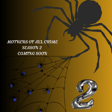Become a Creator today!Start creating today - Share your story with the world!
Start for free
00:00:00
00:00:01

Grooming
This week on the Mothers of All Crime Krystal and Monica divert from their typical content. We wanted to take a beat and discuss a topic that has been mentioned in many other episodes. The concept of grooming, especially in regards to child abuse, is commonly referenced but often misunderstood. Join us as we discuss different aspects of grooming and how predators are able to use it to infiltrate safe spaces for children.
Listener discretion is advised.
May contain explicit language and unfounded accusations.
Like, follow and chat with us @ Mothers of All Crime on Instagram and Facebook. Email us @ mothersofallcrime@gmail.com
Now available on youtube!
Recommended
Transcript
Introduction to 'Mothers of All Crime'
00:00:20
Speaker
Hello and welcome to the Mothers of All Crime. This is a podcast where we deep dive into mothers involved in infamous crimes and scandals. I'm Monica and this is Crystal.
Exploring the Concept of Grooming
00:00:54
Speaker
Welcome back to the Mothers of All Crime. I'm Monica and this is k Crystal. Hello, how are you? I'm fantastic. I'm excited to learn a lot this episode.
00:01:07
Speaker
We're doing something a little different than we usually do where you're going to be kind of educating me. Yeah, I think what we've noticed over many episodes, we've used terms like grooming and like how that affects a lot of the cases we talk about, yet we've never actually talked about grooming.
00:01:29
Speaker
or broken down what grooming actually is for people who may not know. Because it's not just telling someone that they're pretty and then next thing you know, something bad happens. It's an entire process and a strategy that isn't always easy to recognize. And I think it's important to talk about to give more insight into how these predators actually get access to children.
Understanding Grooming Stages
00:01:56
Speaker
Yeah, I do think that's interesting. And I think it's it's one of those terms that you hear a lot and it's in news stories and things like that grooming. But I don't know that it's been defined necessarily.
00:02:11
Speaker
At least not like explicitly. I have a general understanding of grooming. Yeah, so grooming as itself, it's a multi-stage kind of process that predators use to gain access, compliance, and secrecy from their victims.
00:02:27
Speaker
But it's not just for the victims, right? It's for the protectors, the environment. It's the overarching category as well.
00:02:39
Speaker
um And they do that because when you go into a child's life, most of the time there's some kind of protector. There's a parent, a teacher, a coach, the community as a whole.
00:02:52
Speaker
So if you have ill intent towards them, it's not going to be most of the time as easy as just showing up in that child's life.
00:03:02
Speaker
That makes sense. yeah so in the first thing they're going to do is their's step six overall stamp right so the first one is they're going to target so the offender is going to focus in on whatever child they've decided that they want to victimized Because they have vulnerabilities, they have an abnormal home life, they have and a specific emotional need that that offender thinks they can kind of exploit.
00:03:33
Speaker
And they're go to start on step two, which is obtaining the trust. The trust of that child, the trust of their caregiver, the trust of the community. And that's going to give them access to that child and start to identify even more shortcomings that there may be in their life or their area.
00:03:56
Speaker
From here, step three is going to be they're going to fill that need, right? So now that they've decided what the lack is, they have the trust, there's a need there that they might have, such as they might not get enough attention, they might not have enough food, they might not have enough toys.
00:04:15
Speaker
so they're going to start giving them and filling that need. that isolated specialized attention, special gifts, secrets. um And then step four, they're going to start to isolate them.
00:04:29
Speaker
They're going to start to isolate that child and reinforce their relationship from a child's perspective. ah They're going to take away the authority that the child has with other persons.
00:04:42
Speaker
So they're going to try to break down and degrade the ah authority that their parents have, their caregivers have. And put a divide between them so that when the child needs something, they're going to go to that predator rather than maybe somebody else.
00:05:00
Speaker
Step five is gonna be where that relationship becomes sexualized, if that is the goal of the offender. um It could start small from just exposure to explicit pictures, seeing what the child's reaction is, and then they can advance that sexual relationship over time.
00:05:21
Speaker
But also sometimes it goes straight to full sexualization, either oral penetration, whatever the case is. But it that one kind of varies depending on what the predator is or their relationship or access is.
00:05:37
Speaker
And then step six is going to be maintaining that control. So once they have that, they obviously don't want it to disappear. ah They're going to start using things like blaming, threats, secrets to motivate that child to not expose the sexual misconduct that's happening.
00:05:55
Speaker
ah And then once that relationship shifts, the boundaries of violations and sexual violations, the victim often tends to feel shame and responsible for that abuse and they don't want to disclose.
00:06:10
Speaker
And they feel like it's their fault a lot of time. Or if they did expose it, something negative would happen in addition. So, for example, if it is a father who's victimizing a child,
00:06:25
Speaker
And the father is the main provider for the family by exposing that to the police or to a person trusted person. Father might go to jail. Now there's no income.
00:06:36
Speaker
Now you're homeless. So there could be a presentation by the offender of you can't tell anybody because it'll be your fault that everything else happens after the fact.
00:06:48
Speaker
Right. Right. So there's a lot of steps with that. And it's interesting because you don't have, there's not a class, right?
00:07:00
Speaker
Like offenders just seem to have this sixth sense of who they can victimize and who they can't. ah They really are able to have this identification to find people.
00:07:13
Speaker
Who is the most vulnerable? And as twisted as it is, it's actually quite impressive because there is consistency across a lot of these cases. Doug and Miranda's outliers for everything.
00:07:25
Speaker
um But there does seem to be those same steps overall, which it for me is kind of eerie, but it's impressive at the same way.
00:07:38
Speaker
It is interesting because presumably this is not something that people are talking about necessarily. And you're right, you can't take a class or read a book about it. So it's interesting that across different cultures and...
00:07:56
Speaker
people who don't know each other, that they're all coming to the same strategy, which makes me feel like it's maybe an inherent way to manipulate. is And I think that this is not just something that you see in child um abuse situations. or i think that's you know it's it To me, it sounds very similar to someone in a domestic violence situation,
00:08:21
Speaker
where they're also going to be separated and made to be dependent on this person who actually has ill intentions towards them. And I think that if you're separated from other people and your community and protectors, it's easier to become important in someone's life and hold a lot of power over them and use that as ah a way of manipulating as well, I guess.
00:08:48
Speaker
Absolutely. Yeah. Yeah. Yeah, you're going to look at a lot of offenders regardless of what the fence is. If there's going to be some levels of consistency between them all, because like you said, it's easy to once you have control and true control, it's easier to maintain compliance and get what you want and victimize rather than trying to find a new victim every time. That's a lot of work.
00:09:18
Speaker
True. True. And if you're manipulate if you're abusing your own kids or kids that you have access to, wait when you have financial control over them, when you have physical custody of them, when you're maybe in a relationship with their mother, it's you have a lot of different factors that all kind of put you in control over the child being abused.
00:09:44
Speaker
Yeah. And it becomes really difficult to get out of a situation like that because it feels like your authority figures are the ones harming you. So where are you supposed to turn, especially if you've been separated from your other resources?
00:10:01
Speaker
Yeah, absolutely. And then when you have the grooming at or isolation at a community level, it it's very
Community and Authority in Grooming
00:10:11
Speaker
strategic, right? So it's looking at if the predator is able to get unsupervised access to their victim They're also putting their in place in ah responsibility from the community.
00:10:25
Speaker
So if that child decides or that victim decides to expose their abuse, they have the reputation to stand up against the scrutiny.
00:10:39
Speaker
where you have, for example, a really trusted coach. This coach has been there for 20 years, has brought back so many awards, and you have him or her um helping children from broken homes, ending up on full-ride scholarships, or just having a very positive reputation, always volunteering, doing all these things for the community.
00:11:09
Speaker
And then it comes out that they have been abusing children over this whole period of time. there's going to be that reputation that fights back a little bit with the community and be like, oh, i can't that can't be true. They would never. Look at all the positive things they do for children. They would never hurt them.
00:11:27
Speaker
So by going to the community and grooming the community as well, they're really giving themselves that protection and trust to fight and diminish whatever their victims would say.
00:11:43
Speaker
Yeah, that definitely makes, it's kind of like, narcissistic altruism where it's I'm doing things for other people I'm volunteering but it's strictly to make you look good and to make people trust you in this situation um because if it's like I'm the teacher I'm the the coach of the little league team I'm the boy scouts leader then I'm i'm allowed to be around kids I'm supposed to be around kids I'm helping them
00:12:16
Speaker
Right. It's not weird. Definitely part of the strategy. Yeah. Yeah. yeah And if they have one on one. Right. I'm not weird. It's not abnormal. Right. Because if you think about like how many times you have one on one tutoring or coaching or whatever the case is, like sleep over at the Boy Scout leader's house, like that's not.
00:12:35
Speaker
crazy idea yeah well now that we know what's definitely i mean gouts yeah but like sure sure but you could see how that wouldn't be your first thought if that if all of the scandals and horrible crimes hadn't come out about the boy scouts it's similar to the catholic church where I mean, children were trusted to be alone with priests a lot because they are they were looked at as being beyond.
00:13:03
Speaker
Yeah. Yeah. Well, he's a priest. Who can you trust more than a priest? And it's like, well, maybe he's a priest because he can hide behind that. Right. Yeah, exactly. And speaking of disclosure, right, that scrutiny, um the stages of abuse, the stages of actions for abuse is also interesting because you have engagement, which we kind of covered.
00:13:28
Speaker
um They're putting themselves in that position of control over their victim. for their vulnerability. You have interaction where that sexual contact does start.
00:13:39
Speaker
um And then you have secrecy, which is again, that same threats or bribery or manipulation, however you want to put it.
00:13:50
Speaker
But then you have disclosure and suppression. And these two kind of go handin hand in hand. So disclosure only occurs it It could occur multiple ways because disclosure doesn't necessarily need to come from the victim, right? It could come from a third party who accidentally witnessed something happening.
00:14:10
Speaker
It could come from the victim themselves, but it also could come from physical exam. So if you're a child and you're going to those annual exams that people typically go to, part of those exams is you're providers looking at your entire body and sometimes things don't look right or there's indications of contact that shouldn't be happening for someone that age um or a teacher could start witnessing certain behaviors that are abnormal for the age.
00:14:41
Speaker
So disclosure doesn't necessarily have to come from the victim, which I think is really interesting and very important where it's if you're in a position around mainly children, but also adults because adults can also be a manipulated like we talked about.
00:14:59
Speaker
Um, but to see and know and educate yourself on what indications would be is important because otherwise it could just get passed by you.
00:15:10
Speaker
but You also want to be careful of what seems odd and what is experimental. And that's where that line is depending on the age.
00:15:21
Speaker
Um, But the only way suppression tends to happen is through disclosure. So once the victim triggers that, the suppression phase, the authorities could press the pressure the victim into reporting and giving statements, right?
00:15:39
Speaker
But then you have their personal authorities, so their parent, their siblings, their friends, who could be pressuring them not to report and not to take action.
00:15:52
Speaker
Where, going back to that father example, father's one who victimized the child, father gets arrested. Mom is now telling the child to lie to the police because without the father he going who would go to jail, they can't provide for the household.
00:16:09
Speaker
And it would be now it's the child's responsibility and the pressure of the entire family to not report and lie and suppress, again, suppression stage, what the original issue was and keep silent, again, protecting the offender.
00:16:30
Speaker
um And those ones are very connected because, again, can only trigger it by disclosure. If nobody knows and you never talk about it, you're never going to feel the pressure to suppress.
00:16:42
Speaker
There are plenty of circumstances where that doesn't happen, um but that also could be flipped into internal suppression where you may tell someone, but if it's not prosecuted, you're gonna you could bury it down. It could come out in different ways of sexual trauma after the fact, um leading to drug use, mental health issues, um things of that nature also are very common with people who suffer from specifically sexual abuse.
00:17:12
Speaker
um But it's one of those ideas for me that it would, it blows my mind sometimes that you would have situations where someone's telling you not to talk about it.
00:17:27
Speaker
Because I just can't imagine having someone disclose that to me personally and then telling them like, maybe you should keep that to yourself. I just can't even imagine. But it's a very common thing.
00:17:39
Speaker
And it is actually... very well documented on the overall stages of child sex abuse.
00:17:49
Speaker
Yeah, I think it
00:17:52
Speaker
It's a double-edged sword because it's like the child feels shame for reasons, for multiple reasons. that are And none of it's their fault. But I think that often the abusers kind yeah tell kids that it's their fault, manipulate them over a course of time, and make them feel like they're responsible for it in some way.
00:18:12
Speaker
And then it's it's only going to be a big deal. It's only going to be an embarrassing thing. it's only going to Only the police are going to get involved if you tell and anyone. If not, then no one knows and nothing changes and everything can just remain the status quo.
00:18:28
Speaker
And it's earth shattering to report something like that. And now we're dealing with the police and ah going to court. And it's, I mean, sometimes a media thing.
00:18:39
Speaker
It's yeah a nightmare. But it doesn't mean that someone shouldn't be punished for that. And I agree. I think it's crazy. You'd think you'd immediately... just feel terrible for the person that's dealt with this and try to get them any kind of help that you could and run screaming to the police but it's not like that's a painless process either it's really hard for kids to do all of these police interviews and to testify and i mean it's another trauma Right. And I think when you're speaking specifically about children, people forget that, ah not necessarily forget, but don't want to remember,
00:19:19
Speaker
um the majority of children are victimized by someone they know, right? So they're not strangers. And having to sit in front um someone that you know and your family knows is even harder.
00:19:35
Speaker
So it's not like someone you don't know that your family doesn't know. it could be your neighbor, your coach, your parent, your sibling. These are the people that There's an emotional connection to.
00:19:47
Speaker
And even though. Your abuse. Their abuse may have stopped. From a multitude of things. It could be that they are outside the age range. Of the offenders preference.
00:20:00
Speaker
It could be that they were removed. So they could maybe relocated. um They're not at risk from that offender anymore. or they sit that exposure to try to protect other children. So maybe it is a family friend who comes over a lot and the eldest child was victimized. They're now, quote, too old and there's younger siblings.
00:20:26
Speaker
So they might then disclose to try and protect the other siblings from having the same thing happening. Um, which, again, so you have that mindset, now going to police, now going to your family court, having to talk about it, about someone all of them know, i think is even more difficult than if it was a stranger victimization.
00:20:54
Speaker
Definitely, because it's you're blowing up your your family, your school, your world.
Complexities of Male Victimization
00:21:00
Speaker
Yeah, it's it's often someone who's very, very close. So their prosecution for a horrific crime is going to alter your world a lot.
00:21:13
Speaker
Yeah. And then you have the less reported ones violence. in general it's underreported but even more so are those who are male and are victims male victims specifically of sexual abuse are extremely underreported and it could be for a number of reasons um but for example if you are ah straight male and being sexualized victimized by another male you have that internal conflict of
00:21:46
Speaker
A lot of them report feeling that they can't talk about it because they don't identify as gay. But if they come out and say they were sexually abused by a man, having that label put on them is something that they are concerned about.
00:22:00
Speaker
that they won't be believed if they were victimized by a woman. um And you have also males reporting that they don't want to admit to it because it's considered weak, right?
00:22:14
Speaker
So i think this is victimization and grooming in children and is extremely underreported as it is. And then even harder than that is a lot of males don't even report it.
00:22:29
Speaker
of that category too yes i definitely believe that it's very sad but i think that there's a it's i mean you've you've definitely heard before like people say like men can't be raped men can't be sexually assaulted and i think that there are people who believe that it just doesn't make sense to me because obviously if someone's Especially if you're a child, but even if you're an adult and someone's touching you sexually and you don't want them to, then that is you are being sexually assaulted. It doesn't actually matter. It's sort of like a made up concept that men can't be victims.
00:23:08
Speaker
yeah that men are always the perpetrators, I guess, but it's just not the reality of it. And I feel like, especially when you think of situations with like ah a pretty teacher at a school abusing a boy in a class, a lot of the times the thought about that is, oh, well, he's a lucky kid. and no, he's a child being taken advantage of being manipulated by an adult.
00:23:35
Speaker
that's wrong yeah and only the adult is responsible. Yeah, the boys are high-fiving and the girls are crying. Like, that's the media exploitation of it, right? ah Sure. and But also, that's only if the teacher's pretty. Have you noticed that too? If, like, the teacher is, like, not attractive, like, the boys don't want to talk about it, but if the boy, the teacher is pretty, they're, like, rolling around bragging about it.
00:24:02
Speaker
Yeah. Not that it makes it okay, like you're 100% right, but it is an interesting how the perception matters. Even if they are...
00:24:13
Speaker
bragging about it or high-fiving about it, it doesn't mean that it's actually not harming them. like correct It is still changing their perception of sex and relationships and women and ah authority and education and all kinds of things.
00:24:30
Speaker
It's a violation. And I think that a lot of the time, the seriousness of that may not be immediately felt, but I think in the years to come, it may be felt. And I think that it is...
00:24:43
Speaker
there's so much pressure to play it off like it's not a big deal especially with like adolescent and prepubescent boys like oh well you know he got laid so it's totally fine it's like so is he actually genuinely having that reaction or is he performing because he's supposed to have that reaction Oh, absolutely. And I think people forget a lot as well that the result of any kind of grooming or victimization, physical, sexual, whatever the case is, it it could come out during the process. It could come out after the process. It doesn't necessarily...
00:25:26
Speaker
It could come out decades later. And I think that's one thing that people forget is trauma is a lifelong thing. It doesn't just all of a sudden come up and it doesn't all sudden just disappear.
00:25:41
Speaker
um As much as i think anyone who is a victim of any kind of abuse wishes, i i think a lot of... The reports that I've bri looked at, they wish they could just turn it off, but that's just not the case because it got eventually, if not dealt with, bleeds into a lot of the rest of their life ah from anywhere.
Recognizing Grooming Behaviors
00:26:03
Speaker
it And it's too bad because ah people just aren't educated on it, right? So you have different styles that grooming can take place where...
00:26:14
Speaker
it's really hard to identify these behaviors because a lot of them are behaviors of a typical adult-child relationship or an adult-adult relationship.
00:26:26
Speaker
That in the moment you might not necessarily recognize that it's part of the style of grooming until it's too late. um For example, grooming styles, there's three of them.
00:26:41
Speaker
There's verbal coercion, which I think is kind of self-explanatory, but it's the most common one amongst the offenders. This technique is basically where offenders are telling their victims with actions or abuse and they kind of manipulate it as it's part of a game. They'll get a gift at the end. They're going to use their words to coerce their victims into compliance or participation or secrets.
00:27:13
Speaker
The second one is going to be threats and violence. This one is more rare, but it is where they're going to use overall threats or actual violence to intimidate and harass their victims into forced compliance of sexual activity or victimization. And then the third one is drugs and alcohol, which we briefly mentioned in a previous episode um where the offender may have given their victim a substance with or without the victim's knowledge or consent, right?
00:27:51
Speaker
And that's going to be giving it compliance. Very easy to take advantage of someone who is drugged up, drunk, not in control of their body emotions mentally there,
00:28:04
Speaker
And that one is probably the second most common of the three. But again, depending on the offender and depending on the victim depends on which style they're going to use.
00:28:40
Speaker
Oh, hey, sorry. I don't know what happened. I think I hit the mute button. I'm sorry. I can cut this out. the I was like, oh, she's gone. No, I didn't. i I hit the fucking mute button on my mic. So like it wasn't on the computer, but I didn't mean to. It's like a touch.
00:29:00
Speaker
Oh, yeah. No, also, I i wasn't moving. I don't know why that was making noise.
00:29:09
Speaker
Oh, I don't know. It was like, there was just like weird little, it was, it sounded like everything was very clear. And then all of a sudden, like a certain word, you'd be further away or something. Like it was dropping a little bit.
00:29:24
Speaker
Yeah. I don't know why. right. We can pick up where we were. Sorry. What what was the third one? ah Drugs and alcohol.
00:29:35
Speaker
Okay. Do you want to respond to that? ah do you want me to just keep talking? Yes. so So the drugs, and i thought I'm sorry, I thought the drugs and alcohol was the second one. That was the third one.
00:29:47
Speaker
ah okay. So the third one. So when you say drugs and violence, there you go. Yeah. So, sorry, I'm going to just pick right back up.
00:30:00
Speaker
No. No.
00:30:03
Speaker
The drugs and alcohol I think is interesting because i definitely have seen in documentaries and cases all the time that it seems to be pretty common for groomers, child abusers, whatever you want to call them, to be providing alcohol to minors because it's obviously something that it's kind of difficult for minor to get. So I think that it's just another way you're making yourself...
00:30:32
Speaker
valuable to the victim and then it's also they're less likely to refuse because of being like less less inhibitions because of the alcohol but also because of that being the way that they get alcohol and I feel like right I've seen that a lot in my life anyway is like the creepy older guy is always willing to get everybody alcohol or like the weird inappropriate mom is getting her son's friends all alcohol Yeah, and I think that's the version that is what people think about, right? Because that's the version of voluntary ah versus if people are thinking like date rape drugs, that would be a version of involuntary.
00:31:18
Speaker
Someone slipped something in your drink without you noticing and sure next thing you know, you don't remember anything for like 24 hours. so So it really depends on compliance and uncompliant, right?
00:31:32
Speaker
um Yeah. And it is really scary. And it's something that I think, speaking like personal experience, you don't really think about any of that kind of stuff until you're like going to college or you're going and you get told like, hey, like never leave your drink by itself. Or you finally turn 21 and you're going to a bar. Like it's not something that...
00:31:58
Speaker
as a younger person, you get made aware of. And it's a double-edged sword, right? Like you don't want to expose people and children to things that they don't need to be exposed to.
00:32:11
Speaker
But also that, okay, don't take things from strangers is like the watered down version of that, right?
00:32:22
Speaker
Yeah, I guess that's true. I mean, you always think about it in like a club or a bar situation, but I know that that's also something that child abusers use. And I've seen things where like Benadryl and things like that have been used as well, just because it's something that will make you drowsy. And so then you're just more more compliant.
00:32:45
Speaker
It doesn't necessarily have to be a roofie. Right. Yeah. And there's a lot of different cocktails out there that sometimes come up on tests.
00:32:57
Speaker
So like if you end up in the hospital, some of them come up, but then there's a lot of them that don't. ah And so I think. That is one example of how offenders constantly are evolving and figuring out ways to enforce that secrecy, enforce that way around the law where it's, I didn't give them anything illegal as a defense versus giving them something more stronger, something like Benadryl you can buy over the counter.
00:33:32
Speaker
Right. That's true. You don't need a prescription. There's no tracking. There's no tracing. Not really any restrictions on it. So you probably already have it in
Education and Protection Strategies
00:33:43
Speaker
your house, too. So you don't even have to go out and buy it.
00:33:46
Speaker
Similar with NyQuil and like Tylenol PM and stuff like that, where it's you could buy it anywhere. And you go to 10 different stores and buy it, you know, and so you could have a big stash.
00:33:59
Speaker
And I'm sure that there's all kinds of Reddit boards and internet forums where people are giving out these handy tips to each other. Yeah, I really, ah hate to bring up the dark web, um but there are so many forums about it.
00:34:16
Speaker
um There is one thing that specifically child predators are good at is sharing tips and tricks and secrets. um If you know where to look and you know the right person to ask, there is a plethora of information out there. And yeah,
00:34:32
Speaker
and it's It's terrifying when you kind of start actually researching it, looking into it. ah I'm not saying everybody's a danger to your child at all. Don't take that it way. But it's out there. And just because you have these people in your life, these trusted people, that it's still important to educate yourself as a person as a caregiver, as a protector, a someone who may be in one of those positions of care, it's important to educate yourself on what the signs are or what is out there to help support someone who may have already had this happen to them.
00:35:17
Speaker
Because if you don't educate yourself, you're never going to be able to help anybody else or potentially even yourself.
00:35:26
Speaker
That's true. And I think that in the process of getting groomed and abused and how that impacts someone's, you know, sense of like self-esteem and it just, it shakes you to your core, I think. And it actually makes you more vulnerable to that happening again.
00:35:46
Speaker
So it's like, you definitely need to be aware of like what the warning signs are, what the predictors are of this and who, um What kind of behavior maybe is consistent with grooming, because I think that once you've been victimized, it's more likely to happen again. And it would be better for everyone to be aware of what grooming actually looks like. So maybe it's harder to get away with.
00:36:16
Speaker
Yeah. And you're you're totally right. Once victimized, unfortunately, you're, again, predators seem to have this sixth sense about them.
00:36:27
Speaker
Your likelihood of being victimized in the future of either the same crime or a different crime does go up. um And I think having that education is going to help you to try and minimize the option. Listen, sometimes life happens and there is nothing you can do sometimes to avoid stuff.
00:36:53
Speaker
But right sometimes you can do your best to minimize risk. um It's nobody's fault if you are victimized. You are the victim by the sense of the word.
00:37:04
Speaker
The offender is the person responsible for that action. But I do think sometimes put helping and educating yourself or not putting yourself in certain circumstances can minimize risk.
00:37:18
Speaker
um And again, educating around you. So, for example, one thing that i was baffled by when I was doing research on it is mandatory reporting, right?
00:37:32
Speaker
Specifically in schools. When you think about your child in a school, you think they're going to be safe. You think if something's going on, that teacher is a mandated reporter and has to do something about it.
00:37:47
Speaker
That is not true throughout our country. There are actually three states that does not mandate children your teachers to be mandated reporters. And if you are part of any kind of homeschooling education program, there are no mandated reporters.
00:38:04
Speaker
So if you're like in a homeschool program and sometimes they have like group meetups or your parent is your teacher or whatever, they're not required to become mandated reporters.
00:38:15
Speaker
So there's huge population of things people out there that could be completely aware of something and not required to do anything about it.
00:38:27
Speaker
Wow.
00:38:30
Speaker
That's crazy. i feel like that seems silly to even have. like I mean, the homeschooling thing, I don't know what the solution... Obviously, I do think teachers should be mandated reporters, and homeschooling...
00:38:47
Speaker
I think leaves a lot of kids vulnerable because school is a ah safety net of sorts where even if teachers maybe don't have to report, they might.
00:38:58
Speaker
And I think that just having more eyes on someone can be helpful in a situation like that because its it's harder to get away with severe abuse if other people are seeing the victim. And I think if you can just isolate them further and keep them at home, I mean, it obviously depends on who the perpetrator is.
00:39:16
Speaker
but
00:39:20
Speaker
Yeah, i I feel like there should be something in place for homeschool kids, but I don't know what the solution to that would be. Yeah, so there's a um there's an advocate.
00:39:30
Speaker
Her name is Misty Griffin. She actually was originally from the Amish community, which I think we should totally do an episode a different day on. um Oh, yeah, about the Amish for sure. Yeah, so she came from an Amish community, a very strict one.
00:39:48
Speaker
um suffered a lot of CSA, a lot of SA, a lot of CA. um And she is now out and has started a petition called the Child Rights Act.
00:40:02
Speaker
um People can find it on change.org slash Child's Right Act. um And it's specifically for mandated reporting in schools and to help homeschooling kids in those circumstances.
00:40:16
Speaker
So she's taken her personal experience on this exact topic and trying to do something about it because that's the thing is, There is no change if no one tries to do anything, right?
00:40:29
Speaker
And what she's proposing may not be the perfect solution, but at least it's an action. At least it's a step in the direction of protecting children versus just yeah recognizing there's a problem and going, yep.
00:40:44
Speaker
like um she she's very interesting if anyone wants to take some time and she's been on a lot of podcasts um promoting this bill that she's putting up right now so very interesting yeah i think that's a great idea and i mean if she thinks that that could have helped in her situation then i think that that makes a lot of sense Right. Yeah.
00:41:09
Speaker
And again, the problem is what she's trying to do is be retroactive, right? Because there's a lot of things out there that are reactive. um Child sex abuse right now is a public health burden of over $9 billion dollars as a result of what happens to people.
00:41:30
Speaker
and Wow. Yeah. thinking about that from a financial perspective, that's insane. That's 60,000 different children a year being victimized.
00:41:45
Speaker
And there's not enough education for parents. There's not enough education for institutions, preventative, how to help people, right?
00:41:57
Speaker
um So couple other researchers just wanted to talk about that if people are looking to educate themselves that act is really interesting to go check that out she did a podcast with saliste on cults to consciousness that i thought was really educational um also gives a little bit of background on like her and where she comes from um there are safe touch programs that are specifically designed for second and third graders teaching them what is considered a safe touch and an unsafe touch, the differences between secrets and surprises and what to do in encounters of unsafe touching.
00:42:37
Speaker
um There are programs that are in the school system, which I think is important when you have that education. um But there's also parental educations, right? You have programs that were designed this way.
00:42:54
Speaker
a little bit of older one that kind of fell away, but it was educating parents on what stages of them are, right? What is a parent-child communication skill? How do you talk to your children about this kind of stuff?
00:43:10
Speaker
Because I think people get uncomfortable, right? Of course. educate the parents. Sure. And then a another program that I personally really liked was um it's called Stop It Now.
00:43:23
Speaker
It's a program that was founded back in 92 from a CSA survivor, again, trying to prevent trauma. um They look at it as a community-based program where there's steps how to prevent education how to give training to the community, increase advocacy, but also provide services for those who need help.
00:43:49
Speaker
There's a hotline, there's an email, there's chat services. um You can be completely anonymous if you want to go and just so see what's out there. They will talk to you without any questions asked.
00:44:01
Speaker
um There are a lot of sites like that popping up. um The Smart Parent Program of Safe and Healthy Kids also won't ask any questions. if You just want to get parental education that...
00:44:17
Speaker
you can try and incorporate to try and protect yourself and your children around you. um Also darkness of light campaign. That's probably the newest one. um That is an evidence-based theory program, which I am all about. Anything that has evidence backing it, I think is personally the best kind of policy and actions out there.
00:44:40
Speaker
um They've helped over 80% children one- having a one time situation versus multiple times of situations of abuse um and their goal is to decrease victimization down to like four to eight percent um and because they don't want false reporting which is also a problem so they're going to look into well for sure sure Yeah, those steps of barriers, boundaries, and personal bodies and how to educate them.
00:45:13
Speaker
So just to name a few, um if people want more information, I'm happy to provide references for everything we talked about today. um But there are things out there and people should know that they're not alone and there are things that can be done before and after.
00:45:35
Speaker
God forbid anything happens.
Support and Conclusion
00:45:39
Speaker
Definitely. And I ah hate that people feel alone in this kind of ah situation because it clearly is something that happens so, so, so, so much. And nobody should feel bad bad about Having been groomed or having been abused in any of these kinds of ways because it is truly never the victim's fault and it is always the perpetrator's fault.
00:46:03
Speaker
And the more that we know and understand about how they think, like, hopefully the more resources that we can have. to protect people the better and if anybody wants to reach out to us about to get more resources or to ask questions about anything we talked about today like they could email us at the mothers of all crime at gmail.com or reach out to us on instagram or comment on spotify or apple we see everything so we're available Yes, absolutely. hundred percent
00:46:35
Speaker
100%. But that's everything I had. Do you have any other questions, comments? Well, I think you did a fantastic job presenting this information. and I feel like I have a more thorough understanding.
00:46:49
Speaker
And I think that this is something that is it just like helpful general knowledge for a lot of the topics that we have coming up. And i we've, you know, we've been really talking about doing a Mary Kay Letourneau episode. And so I think this is like, you know, it's perfect for that, obviously, like that's such a classic scenario. And I think that there's so many other similar cases to that that just didn't get quite the media attention.
00:47:16
Speaker
So. Oh, absolutely. Yeah. So I, you know, I'll be interested to hear all of your takes on how that situation evolved over time because it it is such a complex case of grooming.
00:47:30
Speaker
And um so I think that it's just really cool how knowledgeable you are. i don't know that I have any... questions right now but I think that's just because you were so good at explaining everything oh thank you thank you but yeah again as a reminder for people well I am currently working on PhD in criminal justice and criminology so I have been learning about this stuff for a very long time and Yes, definitely. it is
00:48:04
Speaker
It is something that I'm very passionate about trying to help the people that can't help themselves, I think is it is a short way to put it. Yeah, and I think that's a very noble goal.
00:48:15
Speaker
And I hope that like maybe in a small way we could even help with this podcast just a little bit, just to provide a little education, you know. just Yeah, small the more the awareness that people can hear is so important. um So well I'll link actually the podcast with Misty in one of the comments somewhere um because I do think it's interesting if anybody wants to listen to it. And there is a petition if you want to sign it.
00:48:43
Speaker
um no pressure but oh yeah send it to me too i'll sign all right beautiful well that's everything we had for today a little bit of an education and next episode we'll go back to our mothers of the week thanks so much bye



















